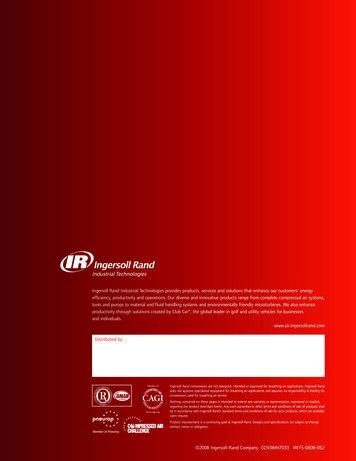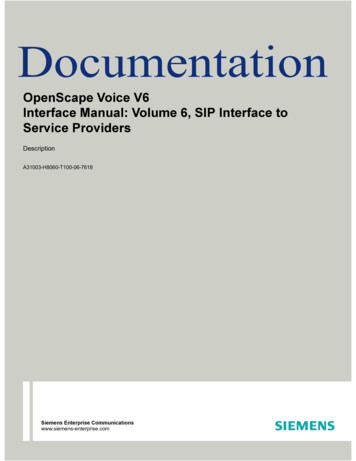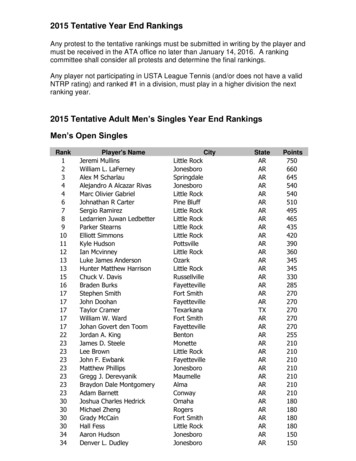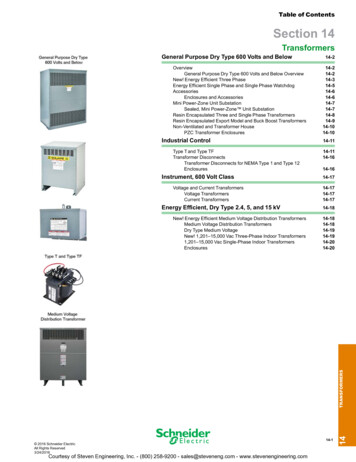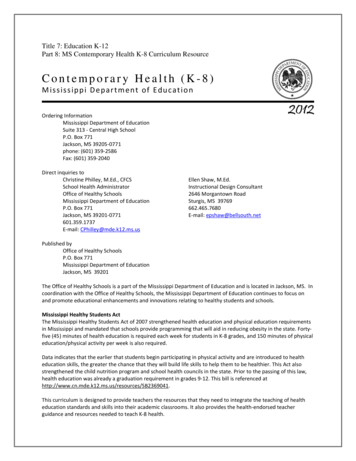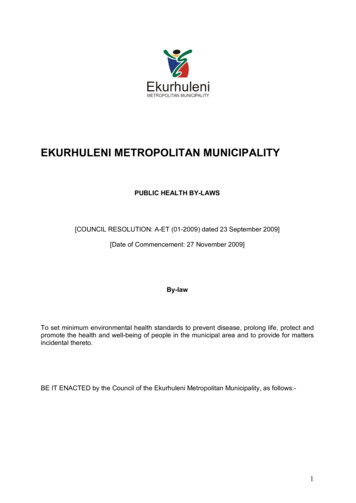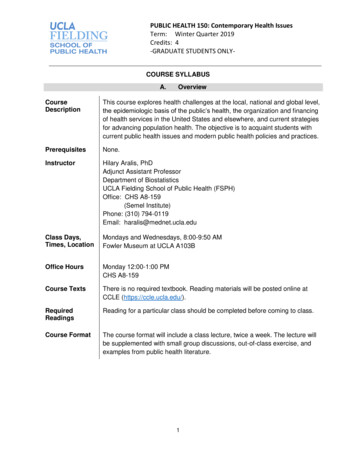
Transcription
PUBLIC HEALTH 150: Contemporary Health IssuesTerm: Winter Quarter 2019Credits: 4-GRADUATE STUDENTS ONLYCOURSE SYLLABUSA.OverviewCourseDescriptionThis course explores health challenges at the local, national and global level,the epidemiologic basis of the public’s health, the organization and financingof health services in the United States and elsewhere, and current strategiesfor advancing population health. The objective is to acquaint students withcurrent public health issues and modern public health policies and practices.PrerequisitesNone.InstructorHilary Aralis, PhDAdjunct Assistant ProfessorDepartment of BiostatisticsUCLA Fielding School of Public Health (FSPH)Office: CHS A8-159(Semel Institute)Phone: (310) 794-0119Email: haralis@mednet.ucla.eduClass Days,Times, LocationMondays and Wednesdays, 8:00-9:50 AMFowler Museum at UCLA A103BOffice HoursMonday 12:00-1:00 PMCHS A8-159Course TextsThere is no required textbook. Reading materials will be posted online atCCLE (https://ccle.ucla.edu/).RequiredReadingsReading for a particular class should be completed before coming to class.Course FormatThe course format will include a class lecture, twice a week. The lecture willbe supplemented with small group discussions, out-of-class exercise, andexamples from public health literature.1
Course: PUB HLT 150: Contemporary Health IssuesTerm: Winter 2019Credits: 4 GRADUATE STUDENTS ONLYClassroomParticipation &AttendanceStudent participation will be measured during each lecture usingiClicker/Reef Technology. Students are required to purchase either aniClicker Student Remote or the iClicker Reef iPhone or Android application.After having purchased one or the other, students need to register theiriClicker/Reef on the course website. This should be done prior to the secondlecture on Monday, January 7th. Students should bring their iClicker (orphones) to every lecture to provide responses to in-class questions that willbe used to evaluate their classroom participation.Options for obtaining iClicker/Reef:-The UCLA Office of Instructional Development rents a limited supplyof iClickers-Purchase the iClicker Reef iPhone or Android application ( 15 for 6months )-Purchase the iClicker or iClicker2 remote ( 24- 28)See www.iclicker.com for more information regarding the last two options anduse of the iClicker device/Reef application.UCLA ADAPolicyStudents needing academic accommodations based on a disability shouldcontact the Center for Accessible Education (CAE) at (310) 825-1501 or inperson at Murphy Hall A255. When possible, students should contact theCAE within the first two weeks of the term as reasonable notice is needed tocoordinate accommodations. For more information visit www.cae.ucla.edu.ADA ContactNickey WoodsCenter for Accessible EducationA255 Murphy HallPhone: (310) 825-1501TTY / TTD: (310) 206-6083Fax: (310) 825-9656InclusivityUCLA’s Office for Equity, Diversity, and Inclusion provides resources, events,and information about current initiatives at UCLA to support equality for allmembers of the UCLA community. I hope that you will communicate with meor your TA if you experience anything in this course that does not support aninclusive environment, and you can also report any incidents you maywitness or experience on campus to the Office of Equity, Diversity, andInclusion on their website (https://equity.ucla.edu/).2
Course: PUB HLT 150: Contemporary Health IssuesTerm: Winter 2019Credits: 4 GRADUATE STUDENTS ONLYB. Learning ObjectivesCouncil on Education for Public Health (CEPH) areas of foundational knowledge are addressedin this course using the learning objectives listed below along with the assessment that willevaluate students’ attainment of these objectives.CEPH Learning Experiences/Course Learning ObjectivesAssessment1. Explain public health history, philosophy and values.2. Identify the core functions of public health and the 10 EssentialServices.3. Explain the role of quantitative and qualitative methods andsciences in describing and assessing a population’s health.4. List major causes and trends of morbidity and mortality in theUS or other community relevant to the school or program.5. Discuss the science of primary, secondary and tertiaryprevention in population health, including health promotion,screening, etc.6. Explain the critical importance of evidence in advancing publichealth knowledge.Small Group Oral Exam7. Explain effects of environmental factors on a population’shealth.(see syllabus Section C:Course Assignments &Exams)8. Explain biological and genetic factors that affect a population’shealth.9. Explain behavioral and psychological factors that affect apopulation’s health.10. Explain the social, political and economic determinants ofhealth and how they contribute to population health and healthinequities.11. Explain how globalization affects global burdens of disease.12. Explain an ecological perspective on the connections amonghuman health, animal health and ecosystem health (e.g., OneHealth).3
Course: PUB HLT 150: Contemporary Health IssuesTerm: Winter 2019Credits: 4 GRADUATE STUDENTS ONLYC.Course Assignments & ExamsClassroom Participation (15%)Participation is defined as 2 or more clicks/responses using iClicker/Reef per classroomsession. Each student will be allowed 2 unexcused absences without penalty. Any additionalabsences will require documentation and should be requested during the first two weeks ofclass (if possible) via an email sent to the instructor or TA.Midterm Exam (30%)The Midterm Exam will occur in-class on Monday, February 11th. The Exam will be closedbook, closed-note and will consist of approximately 100 true/false or multiple choice questions.The Midterm Exam will cover material from Lectures 1-10 (through Wednesday, February 6th).A brief study guide to help students prepare for the Exam will be posted on the course websiteat the start of Week 5.Small Group Oral Exam (15%)The exam is intended to ensure students in these FSPH graduate programs (MS and PhD)meet the content coverage requirements for a degree in public health, as mandated by theCouncil on Education in Public Health (CEPH). The exam will be held in a separate room duringthe last regularly scheduled lecture on Wednesday, March 13th and will last approximately 1hour (from 8:00-9:00 AM). The instructor will administer the exam by asking the small group toprovide answers to a series of open-ended questions. Questions may be aimed at the group- orindividual-level and ALL students will be required to verbally demonstrate a strong knowledgeand understanding of ALL the content discussed in order to receive a passing grade. After theoral exam, graduate students will be free to join the last hour of lecture which will consist of areview for the final exam.Students preparing for the Small Group Oral Exam should review the following topics that willpotentially be covered:-Public health history, philosophy, core functions, and essential servicesBiological, genetic, behavioral, environmental, and psychological factors affectingpopulation healthSocial, political, and economic determinants of health and their role in contributing tohealth disparitiesRole and importance of quantitative methods, qualitative methods, and evidence inassessing population health and advancing public health knowledgeMajor causes of morbidity and mortality at the local-, national-, and global-levels andvariations in these causes over time and across regionsPrimary, secondary, and tertiary prevention in population healthPast, present, and potential future Impacts of globalization on the global burden ofdiseaseOne Health initiative and its importance in the world today4
Course: PUB HLT 150: Contemporary Health IssuesTerm: Winter 2019Credits: 4 GRADUATE STUDENTS ONLYIn addition to the topics listed above, students should have a strong understanding of thecourse material in its entirety.Final Exam (40%)The Final Exam will occur during the scheduled exam date and time on Thursday, March 21stfrom 11:30 AM-2:30 PM. The Exam will be closed-book, closed-note and will consist ofapproximately 120 true/false or multiple choice questions. The Final Exam will cover materialfrom Lectures 1-20, with greater emphasis placed on the content covered in lectures 11-20. Abrief study guide to help students prepare for the exam will be posted on the course website atthe start of Week 10.Grading:15% Classroom Participation30% Midterm Exam15% Small Group Oral Exam40% Final Exam100%Grading Scale:GradePoint:4.04.03.67 3.333.02.67 2.332.01.67 1.331.00.670Final877767Percentag 100-98 97-93 92-90 89-8882-80 79-7872-70 69-6862-60 60837363e:LetterA AAB BBC CCD DDFGrade:Course Assignments and Exams ScheduleWeekDateTimeExam/AssignmentWeek 6Monday, February 11th8:00-9:50 AMMidterm ExamWeek 10Wednesday, March 13th8:00-9:00 AMSmall Group Oral ExamWeek 11Thursday, March 21st11:30 AM-2:30PMFinal Exam5
Course: PUB HLT 150: Contemporary Health IssuesTerm: Winter 2019Credits: 4 GRADUATE STUDENTS ONLYD.Course Policies & UCLA PoliciesMessage about Academic Integrity to all UCLA Students from UCLA Dean ofStudents: UCLA is a community of scholars. In this community, all members including faculty,staff and students alike are responsible for maintaining standards of academic honesty. As astudent and member of the University community, you are here to get an education and are,therefore, expected to demonstrate integrity in your academic endeavors. You are evaluated onyour own merits. Cheating, plagiarism, collaborative work, multiple submissions without thepermission of the professor, or other kinds of academic dishonesty are considered unacceptablebehavior and will result in formal disciplinary proceedings usually resulting in suspension ordismissal.Forms of Academic Dishonesty: As specified in the UCLA Student Conduct Code, violationsor attempted violations of academic dishonesty include, but are not limited to, cheating,fabrication, plagiarism, multiple submissions or facilitating academic dishonesty:Cheating: Unauthorized acquiring of knowledge of an examination or part of an examination Allowing another person to take a quiz, exam, or similar evaluation for youUsing unauthorized material, information, or study aids in any academicexercise or examination – textbook, notes, formula list, calculator, etc.Unauthorized collaboration in providing or requesting assistance, such assharing informationUnauthorized use of someone else’s data in completing a computer exerciseAltering a graded exam or assignment and requesting that it be regradedPlagiarism: Presenting another’s words or ideas as if they were one’s own Submitting as your own through purchase or otherwise, part of or an entire workproduced verbatim by someone elseParaphrasing ideas, data or writing without properly acknowledging thesourceUnauthorized transfer and use of someone else’s computer file as your ownUnauthorized use of someone else’s data in completing a computer exerciseMultiple Submissions: Submitting the same work (with exact or similar content) in more thanone class without permission from the instructor to do so. This includes courses you arecurrently taking, as well as courses you might take in another quarterFacilitating Academic Dishonesty: Participating in any action that compromises the integrity ifthe academic standards of the University; assisting another to commit an act of academicdishonesty Taking a quiz, exam, or similar evaluation in place of another personAllowing another student to copy from you6
Course: PUB HLT 150: Contemporary Health IssuesTerm: Winter 2019Credits: 4 GRADUATE STUDENTS ONLY Providing material or other information to another student withknowledge that such assistance could be used in any of theviolations stated above (e.g., giving test information to students inother discussion sections of the same course)Fabrication: Falsification or invention of any information in an academic exercise Altering data to support researchPresenting results from research that was not performedCrediting source material that was not used for researchWhile you are here at UCLA, if you are unsure whether what you are considering doing ischeating, don’t take chances, ask your professor. In addition, avoid placing yourself insituations which might lead your professor to suspect you of cheating.Alternatives to Academic Dishonesty Seek out help – Meet with your professor, ask for assistance as needed.Ask for an extension – if you explain your situation to your professor, she/he might beable to grant you an extended deadline for an upcoming assignment.See a counselor at Student Psychological Services, and/or your school, college ordepartment – UCLA has many resources for students who are feeling the stresses ofacademic and personal pressures.If you would like more information, please come see us at the Dean of Students’ Office in 1206Murphy Hall, call us at (310) 825-3871 or visit their website at www.deanofstudents.ucla.edu.7
Course: PUB HLT 150: Contemporary Health IssuesTerm: Winter 2019Credits: 4 GRADUATE STUDENTS ONLYE. Course OutlineThis schedule may change as the semester progresses, according to student enrollment and needs.(LE1- LE12 notations indicate coverage of specific CEPH learning experience within a given lecture)WeekDayDateSubject (Tentative)Week 1MondayJanuary 7Introduction to Public HealthExplanation and discussion of public health history,philosophy, values, core functions, and essentialservices. (LE1, LE2)WednesdayJanuary 9Morbidity, Mortality and the Aging PopulationDescription of the major causes of and trends inmorbidity and mortality in Los Angeles, California, theUnited States and globally. Discussion of the causesand repercussions of population aging. (LE4, LE11)Week 2MondayJanuary 14Contemporary Issues in Environmental HealthExplanation of the effects of environmental factors ona population’s health and issues of critical importancein Los Angeles and broader populations. (LE7)WednesdayJanuary 16Epidemiologic Basis of Public HealthDescription of the role and practice of epidemiology asa strategy for the study of factors relating to theprevention and control of disease in humanpopulations.Week 3MondayJanuary 21No Class – HolidayWednesdayJanuary 23Quantitative and Qualitative Methods in PublicHealthExplanation of the role and importance of quantitativemethods, qualitative methods, and evidence indescribing and assessing population health andadvancing public health knowledge. (LE3, LE6)Week 4MondayJanuary 28Public Health and the Science of PreventionDiscuss the science of primary, secondary and tertiaryprevention in population health, including healthpromotion and screening. (LE5)WednesdayJanuary 30Communicable Disease Control and PreventionOverview of the magnitude and burden ofcommunicable diseases. Explanation of the tools8
Course: PUB HLT 150: Contemporary Health IssuesTerm: Winter 2019Credits: 4 GRADUATE STUDENTS ONLYWeekDayDateSubject (Tentative)available to control infectious diseases and how theycan be applied in public health programs to reduce oreliminate diseases in populations.Week 5MondayFebruary 4Health Policy and Politics in the United StatesDescription of the performance of the US healthsystem relative to other nations. Explanation of thepolitics of cost containment, the Affordable Care Act,and recent health policy developments.WednesdayFebruary 6HIV/AIDS Surveillance, Prevention, and ControlDescription of HIV surveillance and epidemiology atthe local, national, and global. Explanation of thehistory of and current developments in HIV preventionand control.Week 6MondayFebruary11Midterm ExamWednesdayFebruary13Social, Political, and Economic Determinants ofHealthExploration of the social, political, and economicdeterminants of health and discussion of how thesedeterminants contribute to population health andhealth inequities at the community and global levels.(LE10, LE11)Week 7Week 8MondayFebruary18No Class – HolidayWednesdayFebruary20Contemporary Issues in Veterinary HealthFebruary25Health Education and Behavior ChangeFebruary27Contemporary Issues in Substance AbuseMondayWednesdayExplanation of the ecological perspective on theconnections among human health, animal health andecosystem health. Description and discussion of OneHealth. (LE12)Explanation of behavioral factors that affect apopulation’s health and discussion of the theories andprinciples of health education, communication, andliteracy. (LE9)Definition of substance use disorders and descriptionof local and national efforts dedicated to substance9
Course: PUB HLT 150: Contemporary Health IssuesTerm: Winter 2019Credits: 4 GRADUATE STUDENTS ONLYWeekDayDateSubject (Tentative)abuse prevention and control. Discussion of the opioidepidemic and other contemporary issues in substanceabuse.Week 9MondayMarch 4Impact of Biological, Genetic and DemographicFactors on Public HealthExplanation of the biological, genetic and demographicfactors that impact a population’s health. (LE8)WednesdayMarch 6Mental HealthDescription of the role of public health in mental healthpromotion, prevention and treatment includingidentification of causes and risk factors. Explanation ofpsychological factors that affect a population’s health.(LE9)Week10MondayMarch 11Contemporary Issues in Global HealthExplanation of how globalization affects the globalburden of disease and discussion of health disparitieswithin and between countries. (LE12)WednesdayMarch 138:00-9:00 AM Small Group Oral Exam9:00-9:50 AM Final Exam Review10
PUBLIC HEALTH 150: Contemporary Health Issues Term: Winter Quarter 2019 Credits: 4 -GRADUATE STUDENTS ONLY- 1 COURSE SYLLABUS A. Overview Course . (Semel Institute) Phone: (310) 794-0119 Email: haralis@mednet.ucla.edu Class Days , Times, Location Mondays and Wednesdays, 8:00-9:50 AM

